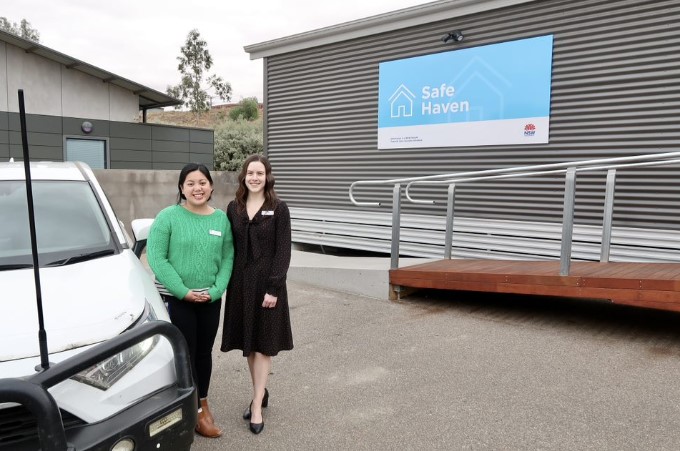
Peer workers Gemenique Pablo (left) and Sarah Kornis at SPOT Broken Hill
As dusk descends on Broken Hill in NSW’s outback, Suicide Prevention Outreach Teams (SPOT) comprising a peer worker and clinician are ready to work, providing a mobile and fully accessible service outside regular business hours. This means more at-risk people in the Far West LHD community receive help more quickly – where they live and feel comfortable.
Sarah Koronis, a psychology-trained clinician working with SPOT at Broken Hill, said the service had already made a significant impact since opening earlier this year.
“The feedback from consumers and families is that they definitely see the initiative as being beneficial,” Sarah said. “We’re also seeing fewer presentations to the Emergency Department (ED) and use of other services has reduced. We’re also capturing people who would otherwise have been reluctant to engage but really do need support.”
Referrals commonly come from the ED at Broken Hill Base Hospital or from police and ambulance officers. Otherwise, the local Mental Health team can refer people who would benefit from after-hours care. SPOT also ties in with Broken Hill’s Safe Haven service that opened in June.
“Even some of the people we’ve seen in SPOT will benefit from the Safe Haven pathway as another alternative to visiting the Emergency Department. I think the two models will work really well together,” Sarah added.
The Safe Haven service is a drop-in centre based near Broken Hill Hospital, offering a calm, culturally sensitive and non-clinical alternative to the Emergency Department, while SPOT can visit homes or other places where people feel comfortable.
Sarah herself has lived and worked in Broken Hill for six years, after moving from her home town of Mildura. She enjoys the sense of community and camaraderie inherent to the remote mining town, but also notes that the region is not without its challenges.
“There has been a number of young adolescents and adults presenting with self-harm and suicidal ideation, and there’s also an array of issues with drought, isolation, substance use and trauma,” Sarah explains.
“The big thing with SPOT is that I work alongside peer workers who have lived experience with suicide. They have that place of commonality when people are experiencing or recovering from situational distress or suicidal crisis.
“We actually want the service to be peer-led, so it feels less clinical. People hopefully will feel more comfortable being supported on the journey of recovery, and really the clinician is there to provide extra support in case any imminent risk shows up.”
SPOT services are also being established in health districts across the State, with $21.35 million being allocated under the Towards Zero Suicide funding framework.
Help where it’s needed
Sophie (not her real name) is a 17-year-old who has experienced hardships throughout her life. She has been known to Mental Health services in Broken Hill since her early teens, having had multiple suicide attempts and gaining little relief from medications.
In a nine-month period, Sophie averaged one inpatient admission per month and numerous presentations to the ED in suicidal crisis. She was then referred to SPOT by her mental health case manager.
Visiting Sophie that evening at home, the SPOT clinician and peer worker supported Sophie to complete a safety plan, and Sophie also verbalised her future goals. She reported positive feedback to her case manager.
SPOT then arranged with Sophie to pick her up from home or a friend’s place to get a coffee and catch up. A good rapport was established with the peer worker, who was able to validate Sophie’s experiences. Ultimately, the prompt and compassionate support provided by SPOT, in a comfortable setting, has assisted Sophie in her goal of living independently.
Suicide Prevention Outreach Teams (SPOT) is a NSW Heath Towards Zero Suicides initiative.
